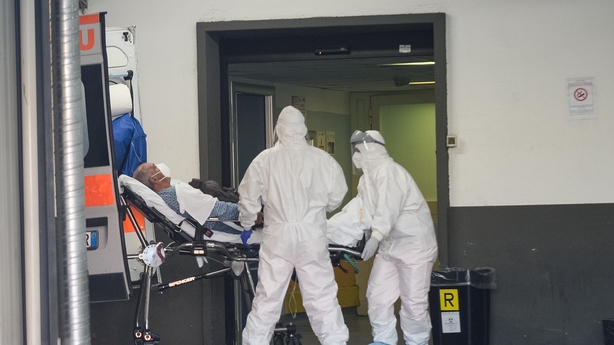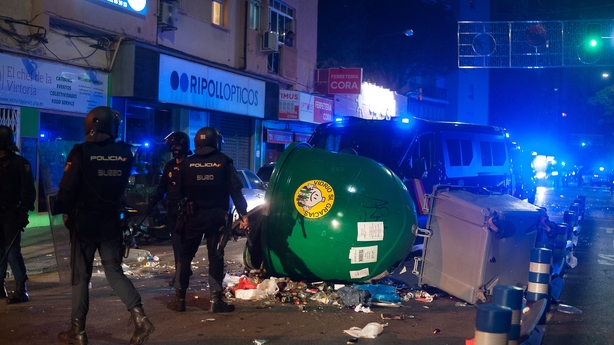More than 3.6 million Slovaks - two thirds of the population - took part in a widely-watched nationwide coronavirus testing programme over the weekend with 1.06% testing positive for the disease.
The scheme to test the bulk of a country in two days is being studied by other nations looking for ways to slow the virus and avoid overwhelming their health systems.
A total of 38,359 people - or 1.06% - of those who took part tested positive and must quarantine, Prime Minister Igor Matovic told a news conference.
"I deeply believe that this solution will work in Slovakia on the condition that those who received certification that they are negative will continue to act responsibly, and those who got a positive result will remain in quarantine with their families," he added.
The premier has been pushing the programme as a decisive way to slow the spread of the virus and avoid a widespread lockdown.
It has faced opposition from some experts who say the antigen tests that Slovakia used - quicker but less accurate than standard PCR tests - are better suited for targeted programmes and need to run with other measures.
Mr Matovic said the government was aware of those concerns but felt that even a 50% success rate in revealing infected people would help.
Children up to the age of 10 were exempt and testing was voluntary for others - but people who chose not to take part must go into quarantine.
Merkel urges compliance with new restrictions
German Chancellor Angela Merkel has urged people to comply with new restrictions to help achieve a "turnaround" in the fight against the worsening pandemic.
"We are dependent on the cooperation, acceptance and understanding of the people in our country for this to work," Ms Merkel said on the first day of a four-week shutdown of restaurants, leisure and cultural centres.
"It's in everyone's own hands to make this November a joint success, a turnaround," she told reporters.
She also said that Germany is still some way off an end to the coronavirus pandemic, adding that Germans will have to limit their contactwith each other during the winter months.
"Throughout the winter months, we will have to limit private contacts," she told a news conference.
"The light at the end of the tunnel is still quite a long way off.
The Chancellor has ruled out big New Year's Eve parties this year but said families should be allowed to celebrate Christmas together, with the necessary precautions.
"It will be a Christmas under corona conditions but it should not be a lonely Christmas," Ms Merkel said.
Germany has led a further tightening of coronavirus restrictions in Europe that have triggered anger and frustration across the continent, while the Covid-19 crisis in the United States deepened.
Germans will not be confined to their homes, but bars, cafes and restaurants must close, as well as theatres, operas and cinemas.
The virus has infected more than 46 million people worldwide, with close to 1.2 million deaths, and the acute outbreaks in Europe and America sparking further alarm about the state of the already devastated global economy.
England prepared for fresh stay-at-home orders, following in the steps of Austria, France and Ireland, with many expressing anxiety about the economic cost of the four-week shutdown due to take effect from Thursday.
Tighter lockdown rules were also set to kick for Belgium, which has the most Covid-19 cases per capita in the world. Portugal, too, has ordered a partial lockdown starting on Wednesday.
In France, Prime Minister Jean Castex said supermarkets would be barred from selling "non-essential" items from tomorrow to protect small shopkeepers who have been forced to close.
Spain has already imposed a nighttime curfew and almost all of its regions have implemented regional border closures to prevent long-distance travel.
The Italian government is expected to announce new restrictions today, according to news reports, with the health minister pushing for a countrywide lockdown.

The threat of the virus was illustrated further when the head of the World Health Organization announced that he was self-quarantining after someone he had been in contact with tested positive.
"I am well and without symptoms but will self-quarantine over the coming days, in line with @WHO protocols, and work from home," Tedros Adhanom Ghebreyesus said in a tweet, stressing the importance of complying with coronavirus guidance.
But the ongoing tightening of virus rules and restrictions has sparked anger in people weary of confinement and the painful economic costs.
That frustration has led to protests in many parts of the world, especially Europe, with some leading to violent skirmishes with police.
Protesters in several Spanish cities clashed with security forces for a second night on Saturday, police said, with vandalism and looting breaking out in some parts.

There has already been violence in several Italian cities, as well as the Czech capital, Prague, recently.
The unrest over virus restrictions has not been limited to Europe.
Riots took place in several Argentinian jails on Saturday, as prisoners demanded the resumption of visits during the pandemic.
The health situation is also deteriorating in the US, which is gearing up for the election showdown between President Donald Trump and his Democratic rival Joe Biden tomorrow.
It is the worst-affected country in the world with 9.2 million infections and more than 230,000 deaths, and the pandemic has been front and centre during the bitter election campaign. With cases surging again, experts have warned of more devastation.
Top government scientist Dr Anthony Fauci told the Washington Post in an interview that the US is "in for a whole lot of hurt".
In Mexico, parades were cancelled and cemeteries closed yesterday during the Day of the Dead festival, in which people normally deck their homes, streets and relatives' graves with flowers, candles and colourful skulls.
Many remembered those who have passed in the privacy of their homes, as authorities urged people to avoid gatherings.

